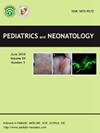Gut dysbiosis as a susceptibility factor in childhood idiopathic nephrotic syndrome
IF 2.3
4区 医学
Q2 PEDIATRICS
引用次数: 0
Abstract
Idiopathic nephrotic syndrome (INS) is a relatively common renal disorder of childhood characterized by severe proteinuria and associated hypoproteinemia and edema. Although the pathogenesis of INS remains unknown, the prevailing theory of its pathogenesis is as follows. Antigenic stimulation, such as viral infections or vaccines, in children with susceptibility factors for INS triggers abnormal immune responses, resulting in production of pathogenic substances that injure podocytes (renal glomerular epithelial cells). The injured podocytes then change their function and morphology, resulting in increased permeability of plasma proteins. Consequently, plasma proteins, especially albumin, are leaked into urine and massive proteinuria ensues. Research on susceptibility factors for INS has focused on polymorphisms in several genes including human leukocyte antigen class II genes. However, we propose that dysbiosis of the intestinal microbiota could be a susceptibility factor for relapse. This proposal is based on our research group finding that children with INS and frequent relapses have gut dysbiosis characterized by a decreased proportion of beneficial bacteria such as short-chain fatty acid-producing bacteria. Dysbiosis from the neonatal period to infancy may result from environmental factors, such as cesarean section delivery and antibiotic administration, which prevent the establishment of a normal intestinal microbiota. Dysbiosis leads to aberrant gut immunity and is characterized by a decreased ratio of T helper 1 cells/T helper 2 cells and an increased ratio of T helper 17 cells/regulatory T-cells. Therefore, relapse occurs when immunologically pathogenic factors that injure podocytes are produced in response to trigger events in children with INS and gut dysbiosis. Our recent clinical trial suggested that long-term oral administration of butyric acid-producing bacterium as a probiotic is promising for suppressing relapse. Therefore, studying the causal relationship between dysbiosis and relapses in patients with INS in a larger number of patients is necessary.
肠道菌群失调是儿童特发性肾病综合征的易感因素。
特发性肾病综合征(INS)是一种相对常见的儿童肾脏疾病,其特点是严重蛋白尿以及相关的低蛋白血症和水肿。虽然特发性肾病综合征的发病机制尚不清楚,但目前流行的发病机制理论如下。具有 INS 易感因子的儿童受到病毒感染或疫苗等抗原刺激后,会引发异常免疫反应,从而产生致病物质,伤害荚膜细胞(肾小球上皮细胞)。受伤的荚膜细胞会改变其功能和形态,导致血浆蛋白通透性增加。因此,血浆蛋白,尤其是白蛋白,会渗漏到尿液中,继而出现大量蛋白尿。对 INS 易感因素的研究主要集中在几个基因的多态性上,包括人类白细胞抗原 II 类基因。然而,我们认为肠道微生物群失调可能是导致疾病复发的一个易感因素。我们的研究小组发现,患有 INS 并经常复发的儿童存在肠道菌群失调,其特点是有益菌(如产生短链脂肪酸的细菌)比例下降。从新生儿期到婴儿期的菌群失调可能是环境因素造成的,如剖腹产和使用抗生素,这些因素阻碍了正常肠道微生物群的建立。菌群失调会导致肠道免疫异常,其特征是 T 辅助细胞 1/T 辅助细胞 2 的比例降低,T 辅助细胞 17/ 调节性 T 细胞的比例升高。因此,当 INS 和肠道菌群失调患儿在触发事件后产生损伤荚膜细胞的免疫致病因子时,病情就会复发。我们最近的临床试验表明,长期口服产生丁酸的细菌作为益生菌有望抑制复发。因此,有必要在更多 INS 患者中研究肠道菌群失调与复发之间的因果关系。
本文章由计算机程序翻译,如有差异,请以英文原文为准。
求助全文
约1分钟内获得全文
求助全文
来源期刊

Pediatrics and Neonatology
PEDIATRICS-
CiteScore
3.10
自引率
0.00%
发文量
170
审稿时长
48 days
期刊介绍:
Pediatrics and Neonatology is the official peer-reviewed publication of the Taiwan Pediatric Association and The Society of Neonatology ROC, and is indexed in EMBASE and SCOPUS. Articles on clinical and laboratory research in pediatrics and related fields are eligible for consideration.
 求助内容:
求助内容: 应助结果提醒方式:
应助结果提醒方式:


